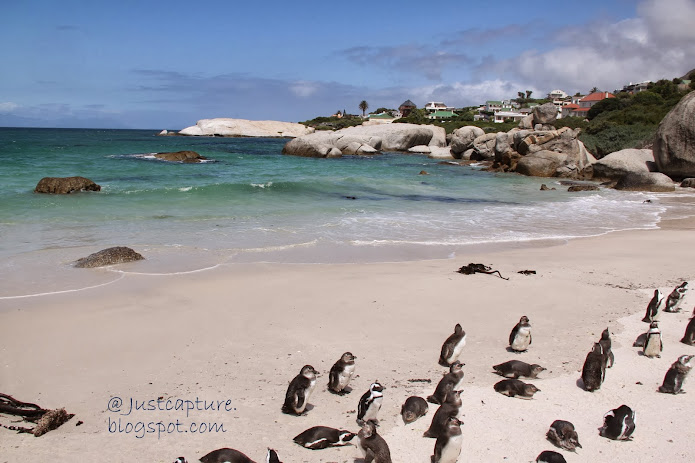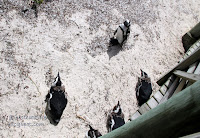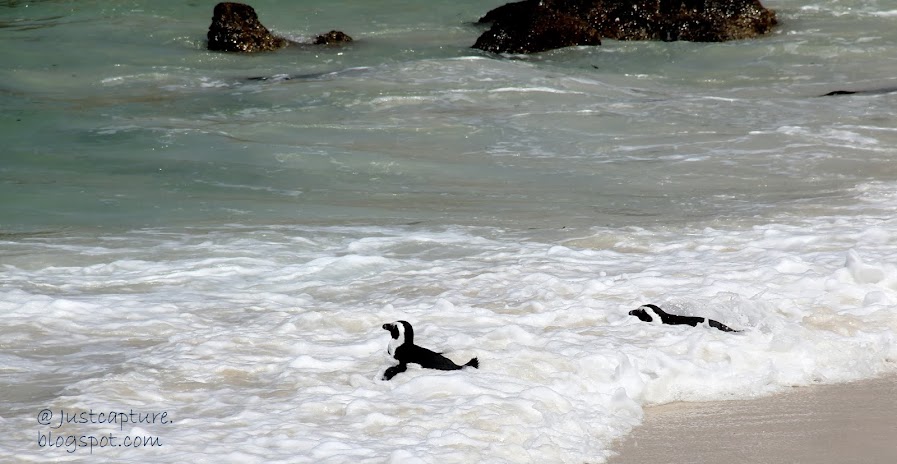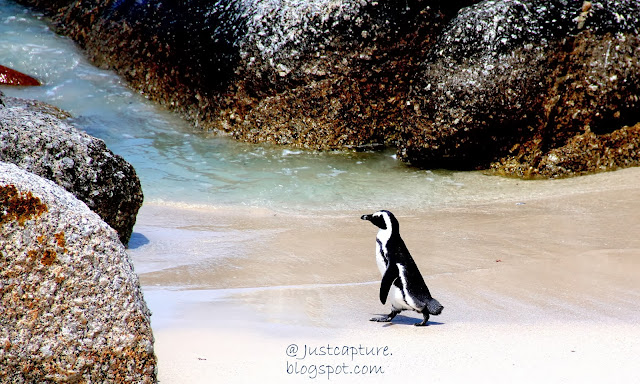Have you ever watched the cartoon show "Happy Feet"?
I did, and I love penguins. Visiting Cape Town, must see Penguins.
We crossed the peninsula to the False Bay side, a cute village called Simon’s Town,
is home of the penguin colony at beautiful Boulders Beach.

is home of the penguin colony at beautiful Boulders Beach.

The African Penguin is a fairly typical penguin species with clean black and white markings and a sharply pointed black beak. One of the unique features of the most African penguins is that they have pink glands above their eyes. This helps them to cope with changing climates. When the temperature gets hotter, the body of the African Penguin sends more blood to these glands to be cooled by the air surrounding it. This then causes the gland to turn a darker shade of pink
The African Penguin has black feet and a number of point-like markings flecked white chest is said to be unique to individuals as fingerprints
They were so adorable.

The African Penguin is monogamous, an adult form pair bonds that last for life.
They are very loving couple, though this two, I think they just have some quarrel...
Most of them are really in love...
And graced us with their happy feet dance.


The African Penguin males are generally slightly larger than their female,
but both are quite similar in appearance.



Previous generations of African penguins burrowed into the deep guano deposits that covered their breeding grounds to create a safe and climate-controlled nesting place for their chicks. Decades ago, the guano was scraped away and used as fertilizer, leaving a barren landscape on which the penguins are forced to nest in shallow depressions on the surface. The chicks are exposed to excessive heat, flooding and aerial predators. In order to protect this love bird species, the fiber glass penguin homes were built, which have been rolled out as part of the Faces of Need project to replace the guano nesting sites.
"Bye, Bye..." He said
There are no words to convey how cute they are, and so clever to choose such a beautiful beach to stay


Penguins have shiny, waterproof feathers that help keep their skin dry. They have more feathers than most other birds - about 70 feathers per square inch. Once a year, penguins molt, losing their old feathers and growing new ones. While molting (which takes about 3 weeks), they cannot swim and do not eat.
So they all have happy sun bath time on the beach...
The African Penguin is monogamous, an adult form pair bonds that last for life.
They are very loving couple, though this two, I think they just have some quarrel...
Most of them are really in love...
And graced us with their happy feet dance.

...and showing us their swimming skill.
Penguins are birds that cannot fly, but penguins swim very well and spend most of their lives in the sea. African penguins can swim at a speed of about 4.3 to 15 miles per hour (7-24 kph).

The African Penguin males are generally slightly larger than their female,
but both are quite similar in appearance.

These adorable birds are also commonly referred to “Jackass Penguins”. They make noise sounds like donkey.

The African Penguin African penguins nest by burrowing into guano (bird droppings) and sand. nesting usually peaking from March to May in South Africa, A clutch of two eggs are laid either in burrows dug in guano, or scrapes in the sand under boulders or bushes. Incubation is undertaken equally by both parents for about 40 days. At least one parent guards the chicks until about 30 days, after that the chick joins a creche with other chicks, and both parents head out to sea to forage each day.
According to researches: African penguins now not only face threats from predators of the sea, sky and land, such as Cape fur seals and Kelp Gulls who eat their eggs. In addition, habitat destruction has led to the loss of preferred nesting sites.

Previous generations of African penguins burrowed into the deep guano deposits that covered their breeding grounds to create a safe and climate-controlled nesting place for their chicks. Decades ago, the guano was scraped away and used as fertilizer, leaving a barren landscape on which the penguins are forced to nest in shallow depressions on the surface. The chicks are exposed to excessive heat, flooding and aerial predators. In order to protect this love bird species, the fiber glass penguin homes were built, which have been rolled out as part of the Faces of Need project to replace the guano nesting sites.
















No comments:
Post a Comment